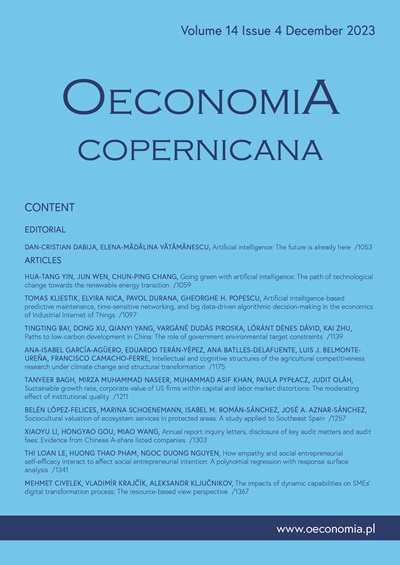绿色金融有能力推广可再生能源技术吗?对全球64个经济体的实证调查
IF 10.8
1区 经济学
Q1 ECONOMICS
引用次数: 9
摘要
研究背景:作为全球应对气候变化共识的成果,绿色金融有望在促进绿色增长和创新进步方面发挥重要作用。一些研究指出,绿色信贷政策对绿色创新产生了负面影响,而绿色金融如何影响可再生能源创新在学术界很少受到关注。本研究的重点是绿色金融对可再生能源创新的影响。文章目的:本研究利用气候债券倡议的绿色债券数据,调查了绿色金融对经济体可再生能源创新的影响。本研究进一步检验了不同能源类型和经济发展水平的能源利用率是否存在差异。鉴于政策是可再生能源技术发展的关键,本研究考察了政府稳定性是否会改变绿色金融与可再生能源创新之间的关系。方法:利用面板固定效应模型和2014-2019年期间全球64个经济体的大规模数据,研究绿色金融对可再生能源创新的影响。在鲁棒性测试中,采用了动态面板模型和面板Tobit模型。研究结果与附加值:本研究发现,绿色金融对可再生能源创新具有积极影响。这种影响在非经合组织经济体以及中等收入和低收入经济体中尤为突出。政府稳定性增强了绿色金融对可再生能源创新的影响。此外,研究结果表明,绿色金融主要促进风能的创新进步,对其他可再生能源的影响较小。子样本分析还揭示了绿色金融在促进可再生能源创新方面作用的异质性。本文章由计算机程序翻译,如有差异,请以英文原文为准。
Is green finance capable of promoting renewable energy technology? Empirical investigation for 64 economies worldwide
Research background: As an outcome of a global consensus on combating climate change, green finance is expected to play an important role in promoting green growth and innovation progress. Some studies note that green credit policy yields a negative influence on green innovation, while how green finance affects renewable energy innovation has received scant attention in academia. This study focuses on the impact of green finance on renewable energy innovation.
Purpose of the article: This research investigates the influence of green finance on an economy's renewable energy innovation by using green bond data from the Climate Bonds Initiative. This research further tests whether it varies for different kinds of energy types and economic development levels. Given that policies are key to renewable energy technology development, this research checks whether government stability changes the relationship between green finance and renewable energy innovation.
Methods: Using the panel fixed effects model and big-scale data from 64 economies worldwide during the period 2014-2019, we investigate green finance's impact on renewable energy innovation. In the robustness test, the dynamic panel model and the panel Tobit model are employed.
Findings & value added: This research finds that green finance has a positive effect on renewable energy innovation. This effect is prominent in non-OECD economies as well as middle-income and low-income economies. Government stability enhances the influence of green finance on renewable energy innovation. Moreover, the results indicate that green finance mainly promotes innovation progress for wind energy and produces little effect for other renewable energies. The subsample analysis also sheds light on the heterogeneity of the role of green finance in promoting renewable energy innovation.
求助全文
通过发布文献求助,成功后即可免费获取论文全文。
去求助
来源期刊

Oeconomia Copernicana
ECONOMICS-
CiteScore
13.70
自引率
5.90%
发文量
26
审稿时长
24 weeks
期刊介绍:
The Oeconomia Copernicana is an academic quarterly journal aimed at academicians, economic policymakers, and students studying finance, accounting, management, and economics. It publishes academic articles on contemporary issues in economics, finance, banking, accounting, and management from various research perspectives. The journal's mission is to publish advanced theoretical and empirical research that contributes to the development of these disciplines and has practical relevance. The journal encourages the use of various research methods, including falsification of conventional understanding, theory building through inductive or qualitative research, first empirical testing of theories, meta-analysis with theoretical implications, constructive replication, and a combination of qualitative, quantitative, field, laboratory, and meta-analytic approaches. While the journal prioritizes comprehensive manuscripts that include methodological-based theoretical and empirical research with implications for policymaking, it also welcomes submissions focused solely on theory or methodology.
 求助内容:
求助内容: 应助结果提醒方式:
应助结果提醒方式:


